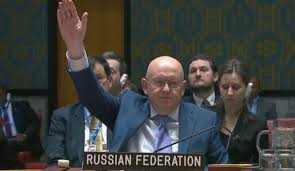Africa
Furious Row at UN as Russia Blocks Sudan Ceasefire Resolution

Tensions escalate at the United Nations as Russia vetoes a resolution aimed at establishing a ceasefire in war-torn Sudan, deepening international divisions over the crisis.
Russia has vetoed a UK-backed draft UN Security Council resolution calling for a ceasefire in Sudan, a move that has been strongly condemned by both the UK and US.
British Foreign Secretary David Lammy described the veto as a “disgrace.” However, Russia charged the UK with interfering in Sudanese matters without involving Sudan directly.
Sudan’s civil war, now ongoing for 19 months, is estimated to have resulted in the deaths of tens of thousands and has displaced over 11 million people from their homes.
According to aid workers, the conflict has led to an unprecedented humanitarian crisis worldwide, leaving thousands at risk of famine.
Sudanese activists have strongly criticized the UN for its slow response to the conflict.
The conflict started in April of the previous year when the army and a dominant paramilitary organization, the Rapid Support Forces (RSF), engaged in a fierce battle for control.
The government is under military control.
The draft resolution introduced on Monday by the UK and Sierra Leone urged both parties to cease hostilities immediately and initiate discussions toward establishing a national ceasefire.
It also urged the army and RSF to adhere to previous agreements for civilian protection, highlighting notably the RSF attacks in Darfur’s western region and other areas of the country.
The Sudanese representative at the UN stated that clauses they desired in the text were omitted.
Except for Russia, all the other 14 Security Council member states voted in favor of the draft; however, due to Russia’s veto, the resolution did not pass.
“This Russian veto is disgraceful and once again reveals Russia’s true colors to the world,” Lammy stated at the meeting in New York.
I implore the Russian representative, who is sitting there on his phone, to consider in good conscience: How many more Sudanese lives must be lost? How many more women need to suffer such atrocities? How many children have to endure hunger before Russia decides to take action?
READ ALSO: Biden Approves Ukraine’s Use of US Missiles for Strikes Inside Russia
Linda Thomas-Greenfield, the US ambassador to the UN, was similarly vocal in her criticism of Russia. She accused the country of hindering efforts “to tackle the dire situation in Sudan and manipulating both sides – each side involved in the conflict to further its political goals at a cost to Sudanese lives.”
Russia, initially perceived as supporting the RSF in the conflict, now seems to have shifted its allegiance.
Dmitry Polyanskiy, Russia’s representative at the UN, stated that Sudanese sovereignty was being overlooked. He further remarked that the resolution supported by the UK was “an attempt to provide themselves with an opportunity to interfere” in Sudan’s affairs.
“Shame on you, the UK!” he later posted on X. “You’re attempting to advance a resolution that exacerbates the Sudan crisis, creating complications for Western countries—particularly in former colonies—that are eager to pursue their own agendas.”
Sudan analyst Alex de Waal characterized this as an “utterly astonishing argument to present amidst the humanitarian crisis—the complete collapse of Sudan’s state and the reality that the government can only administer a very small portion of the country.”
In an interview with the BBC World Service’s Newsday program, he remarked that it was a “very bad day for Africa.” He noted that in the past, diplomats from the continent had successfully used the African Union (AU) to bridge divisions within the Security Council among Russia, the US, and China regarding Sudan.
After the Security Council concluded its discussions, Sudan’s ambassador to the UN, Al-Harith Idriss al-Harith Mohamed, stated that specific “prerequisites” were missing from the draft.
He mentioned that Sudan had sought a clause criticizing the United Arab Emirates for its support of the RSF, an accusation that the UAE has consistently denied.
He also advocated for the RSF to be labeled as “terrorists… due to their engagement in a war of extermination against civilians”.
The army, along with the RSF, faces accusations of human rights violations that may constitute war crimes.
